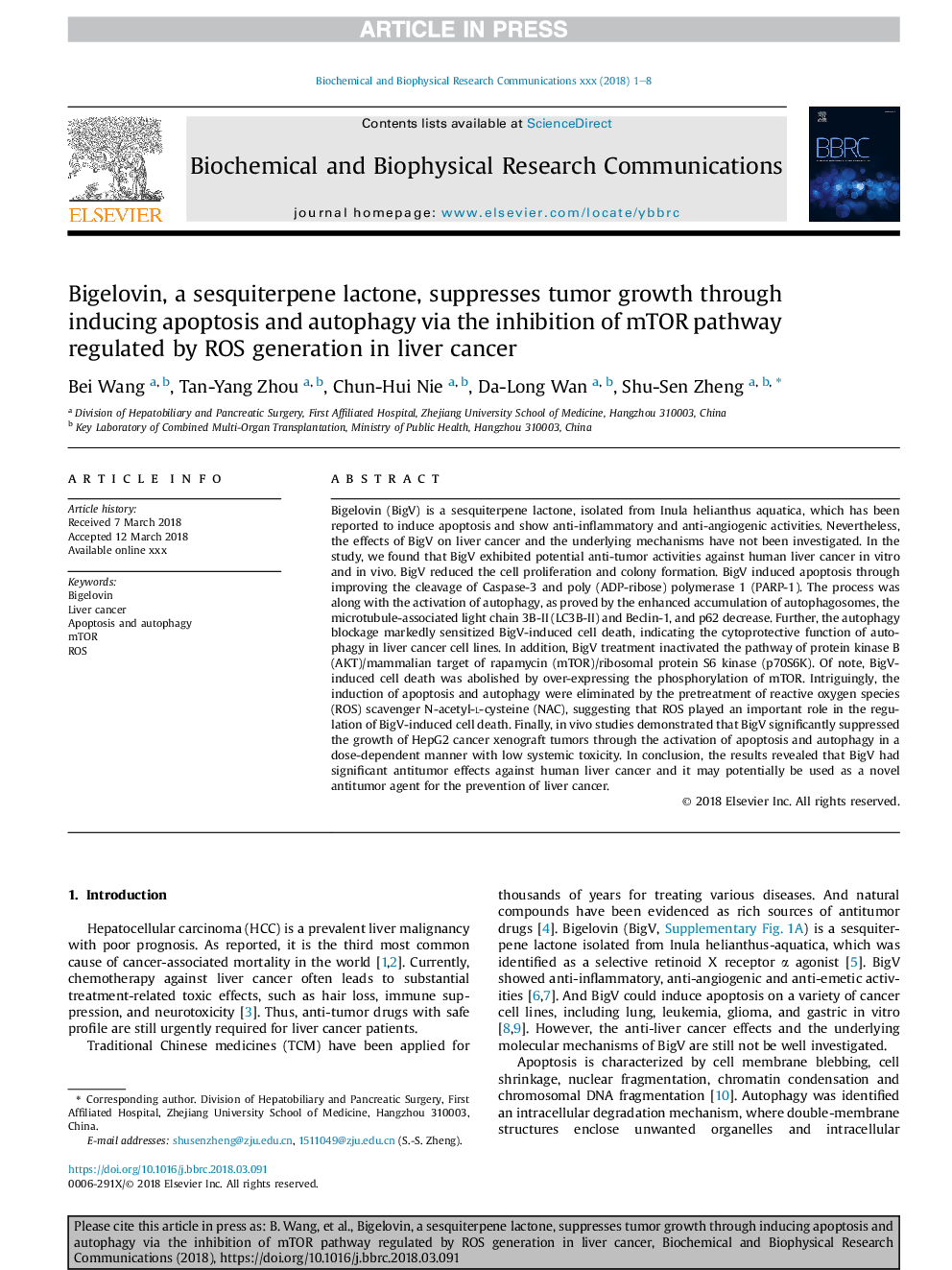| کد مقاله | کد نشریه | سال انتشار | مقاله انگلیسی | نسخه تمام متن |
|---|---|---|---|---|
| 8293099 | 1536742 | 2018 | 8 صفحه PDF | دانلود رایگان |
عنوان انگلیسی مقاله ISI
Bigelovin, a sesquiterpene lactone, suppresses tumor growth through inducing apoptosis and autophagy via the inhibition of mTOR pathway regulated by ROS generation in liver cancer
دانلود مقاله + سفارش ترجمه
دانلود مقاله ISI انگلیسی
رایگان برای ایرانیان
موضوعات مرتبط
علوم زیستی و بیوفناوری
بیوشیمی، ژنتیک و زیست شناسی مولکولی
زیست شیمی
پیش نمایش صفحه اول مقاله

چکیده انگلیسی
Bigelovin (BigV) is a sesquiterpene lactone, isolated from Inula helianthus aquatica, which has been reported to induce apoptosis and show anti-inflammatory and anti-angiogenic activities. Nevertheless, the effects of BigV on liver cancer and the underlying mechanisms have not been investigated. In the study, we found that BigV exhibited potential anti-tumor activities against human liver cancer in vitro and in vivo. BigV reduced the cell proliferation and colony formation. BigV induced apoptosis through improving the cleavage of Caspase-3 and poly (ADP-ribose) polymerase 1 (PARP-1). The process was along with the activation of autophagy, as proved by the enhanced accumulation of autophagosomes, the microtubule-associated light chain 3B-II (LC3B-II) and Beclin-1, and p62 decrease. Further, the autophagy blockage markedly sensitized BigV-induced cell death, indicating the cytoprotective function of autophagy in liver cancer cell lines. In addition, BigV treatment inactivated the pathway of protein kinase B (AKT)/mammalian target of rapamycin (mTOR)/ribosomal protein S6 kinase (p70S6K). Of note, BigV-induced cell death was abolished by over-expressing the phosphorylation of mTOR. Intriguingly, the induction of apoptosis and autophagy were eliminated by the pretreatment of reactive oxygen species (ROS) scavenger N-acetyl-l-cysteine (NAC), suggesting that ROS played an important role in the regulation of BigV-induced cell death. Finally, in vivo studies demonstrated that BigV significantly suppressed the growth of HepG2 cancer xenograft tumors through the activation of apoptosis and autophagy in a dose-dependent manner with low systemic toxicity. In conclusion, the results revealed that BigV had significant antitumor effects against human liver cancer and it may potentially be used as a novel antitumor agent for the prevention of liver cancer.
ناشر
Database: Elsevier - ScienceDirect (ساینس دایرکت)
Journal: Biochemical and Biophysical Research Communications - Volume 499, Issue 2, 5 May 2018, Pages 156-163
Journal: Biochemical and Biophysical Research Communications - Volume 499, Issue 2, 5 May 2018, Pages 156-163
نویسندگان
Bei Wang, Tan-Yang Zhou, Chun-Hui Nie, Da-Long Wan, Shu-Sen Zheng,